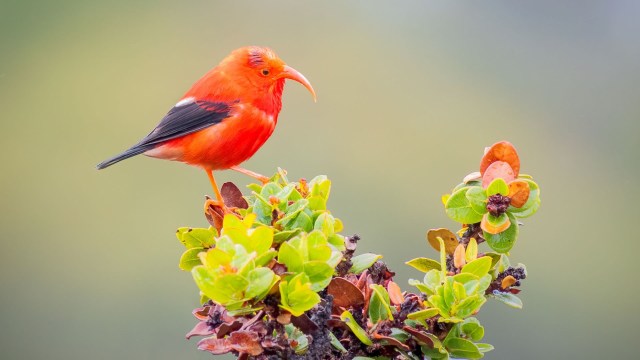Scientists release millions of mosquitoes from helicopters in attempt to save rare bird species: 'You can't not try'

Conservationists in Hawaiʻi are doing something unconventional to help save a bird from becoming extinct.
The Guardian reported that only 17 Hawaiian honeycreeper species are left. There were once more than 50, according to the National Park Service. They are dying in part from mosquitoes that carry malaria and were introduced to the Hawaiian Islands from America and Europe in the 1800s. The birds have no immunity to the disease, so they are at risk of dying after only one bite.
The scarlet honeycreeper is the most vulnerable because it has a 90% chance of dying after being bitten by an infected mosquito, per the news outlet.
The population of the Kauaʻi creeper has also decreased significantly. In 2018, there were 450, and as of 2023, there were only five, the Guardian reported.
The rest of the honeycreeper birds live at elevations above 4,000-5,000 feet. Mosquitoes don't typically go that high because it's too cold, but they are going to higher elevations as the global temperature rises.
The U.S. National Park Service, the state of Hawaiʻi, and the Maui Forest Bird Recovery Project have partnered to use the incompatible insect technique. The Guardian explained that this method involves dropping mosquitoes with "a naturally occurring bacterium that acts as birth control." It stops the female mosquitoes from reproducing. The program consists of dropping 250,000 male mosquitoes from helicopters weekly.
Watch now: Honda reveals how it's rethinking electric vehicles from the ground up with exciting new concept cars
This technique has been used successfully in China and Mexico. It is also happening in California and Florida.
The success of this program should become apparent in the summer when mosquito populations are at their highest.
Haleakalā National Park's forest bird program coordinator on the island of Maui, Chris Warren, said, per the Guardian: "The only thing that's more tragic is if [the birds] went extinct and we didn't try. You can't not try."
The honeycreepers are very diverse. Each species' beak has evolved to eat different types of foods, such as snails, fruit, and nectar. They are also critical to the ecosystem in Hawai'i because they eat insects and pollinate plants.
According to the U.S. Forest Service, pollinators are vital because 80% of the crops grown for food and plant-based products rely on pollination.
These conservationists aren't the only ones protecting plants that need pollination. In Mount Cameroon, a biodiverse area, a beekeeper works to pollinate the surrounding forests.
You can also help plants and animals by upgrading your yard. Here's how to make your garden friendlier for pollinators.
Join our free newsletter for cool news and cool tips that make it easy to help yourself while helping the planet.
Scientists release millions of mosquitoes from helicopters in attempt to save rare bird species: 'You can't not try' first appeared on The Cool Down.
Welcome to Billionaire Club Co LLC, your gateway to a brand-new social media experience! Sign up today and dive into over 10,000 fresh daily articles and videos curated just for your enjoyment. Enjoy the ad free experience, unlimited content interactions, and get that coveted blue check verification—all for just $1 a month!
Account Frozen
Your account is frozen. You can still view content but cannot interact with it.
Please go to your settings to update your account status.
Open Profile Settings